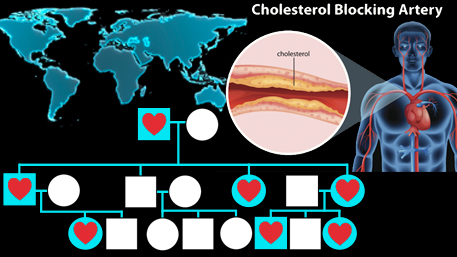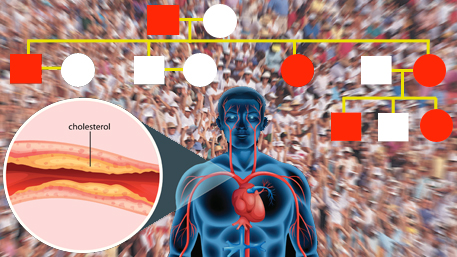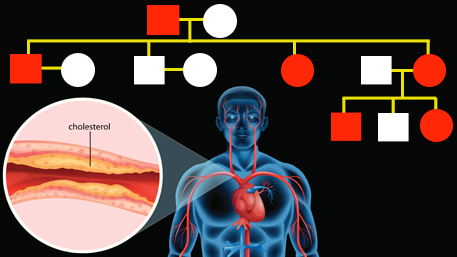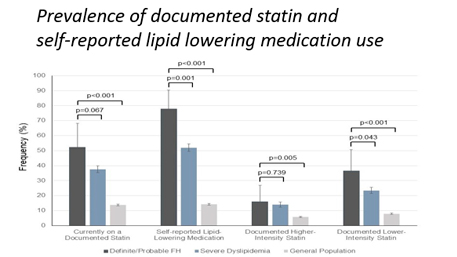Category: familial hypercholesterolemia
Familial Hypercholesterolemia Screening in Children and Adolescents in the United States: Where Are We Heading?

A September 2022 publication recommended that every European country should have a Familial Hypercholesterolemia program for early detection screening, diagnosis, and care. Familial Hypercholesterolemia (FH) is a genetic condition that results in elevated levels of low-density lipoprotein cholesterol (LDL-C) from birth, resulting in increased risk of heart disease and myocardial infarction. A 2021 blog from Read More >
Posted on byHow Common is Familial Hypercholesterolemia?

Familial Hypercholesterolemia (FH) is a genetic condition that leads to high blood levels of low-density lipoprotein cholesterol, also known as LDL-C or “bad cholesterol.” Most people with FH have heterozygous FH, meaning they have only one FH-causing mutation, but in rare cases, a person can have homozygous FH, meaning they have FH-causing mutations in both Read More >
Posted on byImplementation Science to Improve Case Finding, Cascade Screening, and Treatment for Familial Hypercholesterolemia: A Prototype for Precision Public Health Research

Familial Hypercholesterolemia (FH) is a common genetic disorder, affecting more than 1 million people in the United States. FH causes lifelong high levels of low-density lipoprotein cholesterol, and if untreated, leads to a high risk of premature coronary heart disease. Most patients with FH are undiagnosed or inadequately treated with regular or high-intensity statins, leaving Read More >
Posted on byReducing the Global Public Health Burden of Familial Hypercholesterolemia: More Work Ahead

In our previous blog, we discussed familial hypercholesterolemia as a prototype for “precision public health” and how the combination of public health and genetic approaches can contribute to raising awareness, diagnosis, and treatment of more than 1 million individuals in the United States with this relatively common genetic condition. Familial hypercholesterolemia (FH) is an underdiagnosed Read More >
Posted on byFamilial Hypercholesterolemia as a Prototype for Precision Public Health

In October 2019, the 7th annual FH Foundation global summit on familial hypercholesterolemia (FH) took place in Atlanta, Georgia. The theme of the conference was, “Familial Hypercholesterolemia as a Prototype for Precision Public Health.” The meeting brought more than 300 participants from multiple countries to discuss the latest advances in the diagnosis, screening, treatment and Read More >
Posted on byMany Adults with Familial Hypercholesterolemia Are Not Meeting Goal LDL-Cholesterol Level

People with the genetic disorder familial hypercholesterolemia (FH) have increased blood levels of low-density lipoprotein (LDL) cholesterol, which increases their risk for developing coronary artery disease or having a heart attack. A recent study using data from the FH Foundation’s CASCADE FH Registry suggests that many individuals with FH are not meeting blood LDL-cholesterol level Read More >
Posted on byContributions of Public Health in Reducing the Population Burden of Familial Hypercholesterolemia: Challenges and Opportunities

In October 2018, we attended the fifth annual Global Familial Hypercholesterolemia (FH) Summit. This gathering of more than 300 people from over 30 countries included patients, researchers, government organizations, practitioners, health systems, implementation science experts, and industry. The event focused on methods for accelerating uptake of evidence into clinical practice and health policy. The event Read More >
Posted on by 1 CommentPerspectives from a state genetics coordinator: Public health’s role in addressing familial hypercholesterolemia (FH) in the United States

For several years I have pondered what should or could be the state public health agency role in addressing FH. Most of my public health genetics colleagues were actively working on other CDC-labeled tier 1 conditions, such as Lynch syndrome (LS) and Hereditary Breast and Ovarian Cancer syndrome (HBOC). While few, if any, of my Read More >
Posted on byStimulating Implementation Science in Genomics and Precision Medicine for Heart, Lung, Blood and Sleep Diseases: The Case of Familial Hypercholesterolemia

Implementation science is an emerging field of scientific inquiry that has been increasingly applied to genomics and precision medicine. In our recent papers on the state of scientific publications and NIH funding, we have identified areas of growth and limitations of the field and called for more training and workforce development for implementation science in Read More >
Posted on byFamilial Hypercholesterolemia is Common and Undertreated in the United States

Familial hypercholesterolemia (FH) is an autosomal dominant genetic disorder that significantly increases the risk of atherosclerotic cardiovascular disease and premature deaths from heart attacks and stroke. The national prevalence of FH and rates of screening, awareness, and treatment with statins among individuals with FH and other causes of high lipid levels (dyslipidemias) remain largely unknown. Read More >
Posted on by